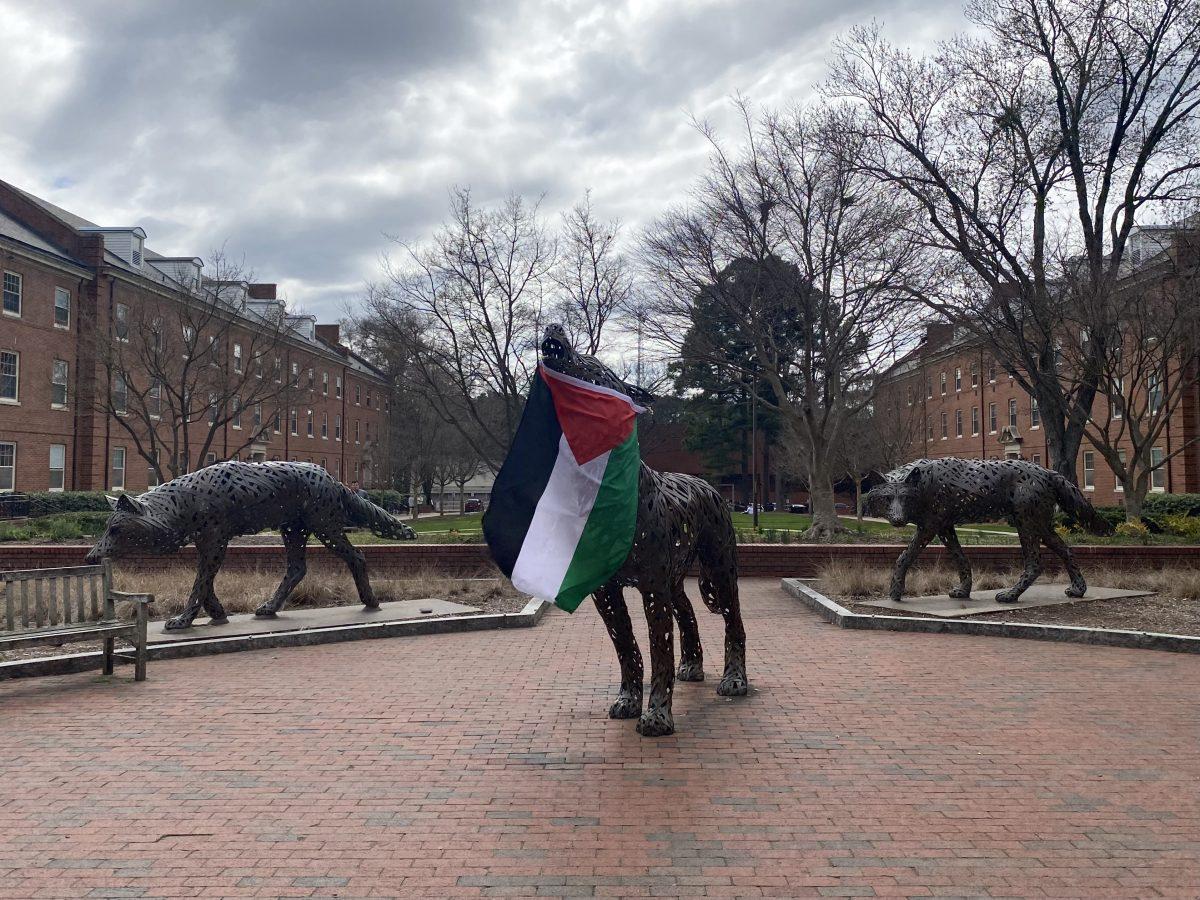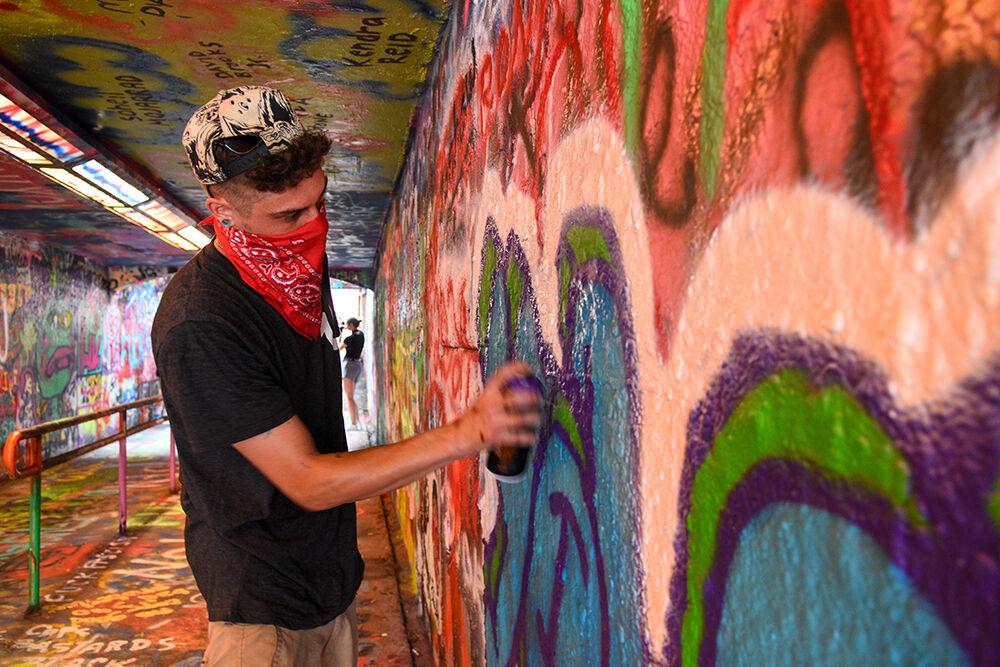Student voices ricocheted off the walls of the Free Expression Tunnel last week as roughly 100 pro-Palestinian demonstrators marched through and called for NC State to take a definitive stance on the Israel-Hamas war.
The University will not take a stance, Chancellor Randy Woodson said, and it’s prohibited from doing so thanks to a state law passed last year that requires all UNC System schools to remain neutral on political controversies.
Now, NC State is reviewing its current free speech and expression policies, and the Board of Trustees will consider adopting a statement to reaffirm its commitment to such.
“Since I’ve been chancellor, I’ve been asked to take all sorts of positions on many different issues affecting the country and the world,” Woodson said. “And you know, at the end of the day, our job is to provide an environment where students can have free and open exchange, faculty can teach and have free and open exchange.”
NC State is a top-ranked college in the nation for free speech, says the Foundation for Individual Rights and Expression’s 2024 free speech rankings — of 254 U.S. colleges, NC State ranked 11th.
But Woodson said the Board of Trustees is looking to ensure the University’s free speech and expression policies are explicitly aligned with the new state law that mandates institutional neutrality, though he said he thinks the University already complies with that law in practice.
Particular members of the Board of Governors have pushed NC State’s Board of Trustees to adopt an institutional neutrality statement over the past year, said Ed Weisiger Jr., chair of the Board of Trustees, at the board’s executive committee meeting Feb. 16. He said he wants to consider adopting the Chicago Principles, which is a document that pledges support for free speech and expression on campus.
Weisiger tasked Woodson with reviewing the principles, which have been adopted or endorsed by over 100 institutions, and Woodson will give a recommendation to the board in April on whether NC State should adopt them.
This initiative comes amidst a wave of renewed dialogue about the role of free speech on college campuses, largely driven by the Israel-Hamas war. At NC State, a petition to demand, in part, broader free speech policies has amassed nearly 500 signatures after a member of the Young Democratic Socialists of America — Nathaniel Dibble, a second-year studying political science — was arrested at a protest Feb. 6.
Dibble was arrested on a charge of second degree trespassing while handing out pamphlets on defense contractors outside the Engineering Career Fair. Lauren Barker, senior media relations strategist for University Communications, said Dibble was asked several times to leave the area and refused to leave before NC State Police arrested him. Dibble said he thinks NC State is trying to suppress speech.
“I feel like NC State can try intimidating us; they can give me disciplinary action; they can have me arrested, etc., but at the end of the day, I’m still a student,” Dibble said. “I still have rights, my free speech, and I know that what they’re doing is simply to try and get us to stop participating. So I refuse to give them that victory.”
In a January letter to the chancellor, the Arab Student Organization and ten other student organizations asked the University to take decisive action on the war.
Woodson’s response, which Technician obtained in a public records request, said the University would support all students but emphasized that NC State must remain neutral due to state law.
At last week’s protest, Jamal Mohamad, a fourth-year studying business administration and president of the ASO, acknowledged the law mandating institutional neutrality but said NC State should consider other demands raised in the letter, such as providing educational resources to students on the war and boycotting companies like Lockheed Martin, Caterpillar and Boeing.
“All we want is a sliver of tangible change, and that’s why we’re here,” Mohamad said to protesters in Wolf Plaza. “We want our voices to be heard. We will cause disruption; we want people to see us; we want our demands to go through.”
Barker said a student was cited for impeding the flow of traffic at the protest.
Dibble said he thinks speech on campus is not so much promoted as it is permitted, and he wants to see more expansive free speech policies for students.
“I don’t think that, for example, those Brickyard preachers should be able to come from off campus and harass our students day after day, and I’m also not happy that I got arrested for handing out pamphlets, for expressing my freedom of speech,” Dibble said.
NC State’s Use of University Space regulation says student groups can pass out non-commercial written materials in any outdoor space on campus and in the common areas of Talley Student Union and Witherspoon Student Center. It also says use of University space must not block pedestrian, bicycle and automobile traffic.
Laura Beltz, director of policy reform at FIRE, said some speech and expression isn’t protected by the First Amendment — schools can step in when speech creates a disruption to the educational environment. But schools can play a powerful role in educating students on the line between protected and unprotected speech, she said, and she thinks NC State has an opportunity to do this by adopting the Chicago Principles.
“I hope that they don’t just rubber stamp it and move on, but actually do take a step back and really consider how to not just adopt the policy, but really integrate it into their other policies and practices,” Beltz said. “And teach students about it and share it with students, rather than just signing off on it — but I think adopting the statement is good stuff either way.”
Woodson has asked Provost Warwick Arden and Vice Chancellor and General Counsel Allison Newhart to do a review of NC State’s current policies before he presents his recommendation to the board.
Timothy Reid, a fourth-year studying business administration and the student body president, said he thinks the Chicago Principles fall in line with NC State’s values.
“It’s a good thing to be put in contact and have engagement with individuals whose views and beliefs and backgrounds and experiences are different than yours,” Reid said. “And me personally, I just believe that should be fundamental to the college experience just because that enlarges your worldview, and that’s certainly been the case for me.”
Mark Ross, a third-year studying mathematics, spray paints the word "YOLO" in the Free Expression Tunnel on Saturday, August 8, 2020.














